- Home
- Iain Rob Wright
Extinction: An Apocalyptic Horror Novel (Hell on Earth Book 3) Page 13
Extinction: An Apocalyptic Horror Novel (Hell on Earth Book 3) Read online
Page 13
“Bottom’s up, bitches,” he said upon returning to the pool table.
Aymun waved a hand. “Not for me, thank you.”
Mass took two beers and chewed off the lids with his back teeth. After taking his first hearty swig, he belched. “Shit, it’s been a while, huh? Need to get a buzz on like you wouldn’t believe.”
Vamps understood all too well. It was good to take a load off finally and stop fighting for their lives. The beers were unlimited and the company good. He felt like a taut spring uncoiling.
Aymun grabbed a fizzy orange from the bar and also brought back an ice bucket filled with snacks. The crisps and chocolate made Vamps think about the kid, Max, but Mass noticed and didn’t allow him to dwell. He threw him a cue. “You’re up, man. I’ll let you break.”
Vamps caught the cue and grinned. He chalked up the tip and leant over the table. “Now, Aymun,” he advised. “You wanna get nice and low so you’re behind the cue ball. Then you just…” He fired the cue, launching the white little cannonball. Two reds and one yellow sank into the corner pockets. “Hit that son of a bitch like it fucked your mother!”
Aymun chuckled. “Such an elegant teacher of the arts.”
“Swagger is as much a part of this game as skill, yo. You wanna make this shit look easy to your opponent.”
Mass took his turn and sent the cue ball leaping off the table. In anger, he kicked the table and sent every ball on the table two inches to the left. “Bollocks!”
Vamps waved a thumb at Mass and smirked “See, Aymun? I put him off his game.”
Mass retrieved the cue ball from beneath an X-Files pinball machine and placed it back on the baize. “Been a while, playa. Need to get my eye in.”
“You ready to have a go, Aymun?” Vamps offered his cue.
Aymun waved a hand. “I shall watch a little longer.”
“Suit yourself. So, what did you used to do for fun back home? Terrorist shit, right?”
Aymun pulled up a chair and sat down. “There was little in the way of fun back home. My people knew only suffering.”
“Then they might have had half a chance when the gates turned up,” said Mass, leaning over the table and readying himself for another shot.
“No man could prepare for such evil. We brothers and sisters have been too long distracted, fighting amongst ourselves. We did not realise the true threat that was coming.”
Vamps saw the pain on Aymun’s face and wished then that he and Mass weren't so dismissive of what he'd been through. It had obviously been a lot; both before and after the gates had arrived. Vamps and Mass may have been gangsters, but Aymun had his own streets to survive. “Maybe this will change things for the better, Ay. Maybe once the dust settles, we'll be better to each other.”
Aymun nodded, but didn’t seem to believe it. “I fear it is man’s nature to self-destruct. When I entered the gate, I walked through hallways filled with the damned. There is no Hell for any animal but man. We are the only species capable of being wicked. Evil is not a part of our nature—it is a cornerstone of our nature. I have killed. You both have killed. Men kill. We condemn ourselves.”
Mass took another shot and potted a yellow. He straightened up before taking his next shot. “It’s our ability to be evil that makes it count when we're good though, right? Being human is a battle, man, but it’s what makes us strong. It’s what will help us win this war.”
Aymun plucked at his beard and nearly smiled. “Perhaps you are right, my brother. I will take my shot now.”
“Yeah, my playa!” said Vamps, whooping and handing over his cue.
They stood back while Aymun made a clumsy attempt at potting a ball. At least he didn't foul.
“Not a bad first attempt,” said Mass, swigging the rest of a beer.
“It is a fun game. May I have another turn?”
Vamps nodded. “Knock yourself out.”
This time, Aymun potted a red in the centre pocket. He straightened up and beamed. “Good, yes?”
Mass and Vamps both chuckled warmly and patted the Syrian on the back. “Well done,” said Vamps. “You know, you have a friendly face when you're not frowning like a bouncer.”
“That is just my thinking face. I will try to think less.”
“Eh, yeah… cool.”
They started a new game—practice session was over. Mass played Aymun, with the winner to face Vamps.
“So, tell us about Syria,” said Mass as he lined up his break.
Aymun sat on a stool, sighed, and then gradually began. “A place of hardships, but as you say, people gain strength through their struggles. When I was a boy, Damascus was frightening because nothing ever changed. Rules were never to be broken, or the police would punish you cruelly. After the rebels rose up, it became a place of fear for other reasons. Death could fall from the sky at any moment. A quiet corridor could fall in on you from an indiscriminate bomb. Yet, in the last days of my country, there was hope. I saw the kindness God intended for us.”
He linked his fingers together across his lap and glanced upwards as if picturing the story he was about to tell. “One day, I walked down a street. Once was a market street, but Assad’s forces reduce it to rubble. There I see a little old lady. I know her face, for she is wife of local baker. Every morning, she sell her husband’s bread, and today she does so in an empty, bombed-out street. No one else is around. I go to this lady, and I say, ‘Lady, this street is safe no longer. Why do you not go home?’ This lady look at me and tell me, ‘Sir, my home was right behind where you stand. Now is gone. My husband sleep there in his bed, tired from baking bread. He gone too when bombs fall. All I have left is bread he make.’”
Vamps shook his head. “That's fucked up.”
“That is not the point of story. I smile at this lady, and I say, I would like to buy some bread. But when I try to give her money, she shakes her head. ‘No, no sir,’ she say, ‘this bread is for free. People’s homes have been destroyed, and they have nothing. How can I ask for their money?’ I frown at her and tell her she does not even know which side of war I am on. I could be one of Assad’s men who blew up her home. She just look at me, pressing the bread into my arms. ‘My husband did not judge,’ she said, ‘so I will not either. All men fight to protect what is theirs. I give what I have for free so cycle can be broken. All that I have, I shall give, and so I will never be forced to fight for what is mine. I shall never have reason to kill.’”
Aymun unlaced his fingers and let his palms rest on his knees. The simple gesture somehow made it clear he was done.
Vamps wanted to fill the silence with words, for that was his way, but for once, he found himself silent. He thought about his own life, hanging around the streets with nothing to his name, but strutting around like he had it all. His reputation had been a facade, he realised—an imaginary possession because he had, nothing real. The old woman had been right, men fought over what they had and what they wanted. That was why the world got so screwed up. Humanity had developed through a constant struggle for possessions. Land, money, oil, power…
“It was all bullshit, wasn’t it? I mean, life. The world. It was a joke.”
Aymun nodded tenderly. “God gave us the freedom to work things out for ourselves, but we came up with the wrong answers. Life is a gift to be shared. Mankind is supposed to be a glorious, loving family, but instead, we allowed ourselves to become a species of individuals.”
“What happened to the old lady?” asked Mass, clutching his cue against his chest and twiddling it between his palms.
“She died a day later,” said Aymun. “The rebels that time. Her life was ruined by one side and ended by the other. When I find her body in the rubble, she had no more bread. She had given it all away. I placed a blanket over her and promised never to forget. I tell my brothers of her courage, and she lives on.”
Vamps smiled. “Yeah, I like that.” He lifted his beer. “Here’s to the baker’s wife. I hope she has her family back in Heaven.”
&nb
sp; The three men clinked bottles and went back to playing pool. Vamps noticed that his sword was flickering on the bar, but he decided to ignore it. Tonight was for letting go of the fight. Tomorrow could be about killing. He placed the sword out of sight behind the bar, and then re-joined his brothers.
His family.
18
GENERAL WICKSTAFF
The ground shook. Middle of the night, but Wickstaff was already fully dressed and only half asleep. She stood outside the command block, demanding to know what was happening. The floodlights glared, illuminating bodies rushing back and forth like headless ants. Despite the several thousand soldiers under her command, Wickstaff knew most by name, which was why she quickly reached out and grabbed the nearest corporal. “Tell me what’s happening, Dee.”
“They’re coming,” the man said, looking everywhere but at her. “Christ, it’s actually happening. They’re out there. The demons—”
Beneath their feet, the ground shook.
Wickstaff cupped the back of the corporal's neck and pulled him close. “Calm down, Dee. Let’s not shit our knickers just yet. We have plans in place, remember? Head to the drill square and ring that bloody bell. You need me to tell you the signal?”
He gawped at her, eyes twitching.
“Dee! Do you know the bloody signal or not?”
The corporal snapped back to reality and nodded frantically. “Seven peals followed by a five second pause, then another three peals.”
“Good, lad. Now go!”
The corporal raced off to ring the muster bell. The brass relic was ceremonial more than anything, but in the absence of reliable electricity, it had become the agreed upon alarm. Its pealing would let all of Portsmouth know full battle-stations were in effect, and the enemy was at the gates. Luckily, those gates had been forged from iron, as had several of the barricades blocking the main roads. One benefit of digging-in at an old naval port was the abundance of iron. The city's many museums played home to iron anchors, antique ship fixtures, and even the huge iron frames from a pair of 19th century warships. Men had gathered the scrap at a collection of choke-points at the city’s widest roads and thoroughfares, where the enemy could be funnelled into narrowed kill zones—spaces between rows of taller buildings where soldiers could fire down from both sides of the street. Several areas were also earmarked for bombardment from the warships in the docks. Once the bulk of the enemy forces inevitably passed into the city, she would call in the artillery to rain down death.
She was prepared for this.
She had this under control.
There was no other way.
A jeep skidded outside the command block and one of Wickstaff's lieutenants leant over and threw open the passenger door. Her chauffeur had arrived. Wickstaff nodded and got in. Her driver sped her over to the large sentry tower on the edge of the naval base. Fortifications extended another half-mile out into the city, but from this tower, she would be able to see what was coming their way. The guard tower's roof had been pulled down and replaced with a rickety platform accessed by a stepladder. It gave the tower another fifteen-feet of height compared to the original structure and allowed a sentry to see right to the outskirts of Portsmouth.
Wickstaff nodded to a group of soldiers assembled at the bottom of the tower and then started her way up the ladder. The ground continued to shake with distant rumblings. How many thousands of clawed feet were bearing down on them? Did Portsmouth even stand a chance?
Lord Amon would be among the enemy for sure, and would be unstoppable unless Guy and Rick came through closing the gate. All she could do was try to keep her people alive until then. Was it an impossible task? She would find out.
Climbing the ladder, she reached the original crows nest and grabbed hold of the stepladder that would take her up to the roof deck. The steel rungs vibrated in her hands, and worryingly, the whole ladder wobbled when she assailed the first step.
“It’s tied with rope,” someone called down from the shadows. “It gives, but it won’t fall. Hold on tight, and you’ll be fine.”
Wickstaff tried to see who was up there, but had to look away when rain started filling her eyes. She hadn’t even noticed the downpour. The voice sounded familiar. “M-Maddy? Is that you? What on earth are you doing up here?”
“Wanted to pull my weight, so I've been bringing refreshments to the sentries. Arrived just in time to catch the show.”
Wickstaff trotted up the ladder and heaved herself onto the cramped deck. With Maddy stood a grizzled old sergeant with binoculars in his hands. A monstrous sniper rifle lay propped up against the wooden boards by his legs. “Welcome to the eagle’s nest, ma’am,” the man said in a voice thick with manliness. The unmistakable tone of Carl Martinhal, an active SAS soldier who had been on leave when the gates opened. He was about as tough a man as she had at her disposal, but his skill with a rifle made him a real asset.
“Thanks for having me, Sergeant Martinhal. I hear we have guests?”
“Don’t we fuckin’ just,” He handed over the binoculars, as casually as if they were at the opera. “Get your peepers on those.”
Wickstaff looked through the binoculars and scanned the horizon. It didn't take her long to react. “Bonk my giddy aunt. Looks like they came to do more than just visit.”
The city at large was poorly lit, the floodlights and petrol generators being centred on the naval base, but it wasn't difficult to understand the situation. The shifting shadows of an endless horde filled the horizon like raving highlanders. A legion of the damned.
“Get me a radio,” ordered Wickstaff. “Time we teach these dirty buggers a lesson. That, when it comes to making war, mankind has no equal.”
Martinhal smirked. “Yes, ma’am.”
A radio was shoved into her hand, and she gave a dozen orders to a dozen different sub-leaders in less than a minute. Then she waited. The rain pitter-pattered against the deck.
The screaming began one second before the first chattering gunfire. Muzzle flashes lit up the city like fireworks. Every gloomy alleyway now flashed like a rave was taking place. The city's darkness lifted, replaced by a radiant orange glow and white smoke. Grenades boomed. Windows shattered. Soldiers bellowed to one another, fighting together—dying together. Men wailed as terrible fates befell them, and demons screeched with delight. The demons had drawn first blood.
The battle might be lost already.
Wickstaff snatched the sniper rifle from the boards and propped it up on the railing. The weapon sported a night vision scope, which meant she got a better look at the nightmare coming their way.
It was an unwelcome sight.
Through the scope, a luminous green mass swarmed through Portsmouth's ancient streets. Frightened soldiers crouched behind cover, mostly unaware they were being surrounded. But no man or woman ran. No one threw down their weapon and surrendered.
They were ready to fight.
Wickstaff lined up the rifle's cross hairs and yanked the trigger. She took the head off a burnt man just as it was about to fall upon a stumbling soldier yet to find cover. The man dropped to the ground in surprise when his unseen attacker’s skull turned to mist right in front of him. He took advantage of the rescue and got himself behind a bulky Range Rover, where a machine gunner had already entrenched himself inside the sunroof. Wickstaff took another shot and kneecapped a leaping primate and spun it like a leaf in a storm. As the creature squirmed on the ground, the machine gunner finished it off, making its corpse dance. Wickstaff wasn’t quick enough to line up her next shot, and a burnt man waylaid the machine gunner and the unlucky soldier beside him. The machine gunner took care of it with a handgun, but the distraction delayed both men long enough that a squad of demons were able to blindside them. Wickstaff heard their screams a half-mile away.
The enemy moved closer.
Wickstaff turned to Sergeant Martinhal and snatched the radio again. “All units in Zone 2, fall back to inner perimeter. Artillery Groups 2 and 4, reduce Zone 2 to d
ust. I want to see Australia through the craters you leave.”
“Roger that.”
She kept hold of the radio, but handed the sniper rifle to the sergeant who would put it to better use than her.
“Are you okay?” Maddy asked, suddenly reminding the general of her presence. A civilian.
Wickstaff nodded. “The whole humanity in peril thing is old hat now, my love.”
“What can I do to help, General?”
“Keep a clear head for me. Giving orders is a lonely business. I need someone I can curse at if the need arises. Sorry, Maddy, but you’ve got that job.”
“It’s an honour. Mind if I swear back at you?”
“Fire away.”
“Send those fuckers straight back to Hell, General.”
Wickstaff chuckled. Maddy was exactly what she needed right now—an anchor to keep her feet on the ground while she made decisions that could end the human race.
Or save it.
Somehow that was the prospect that scared her more.
“By the time I’m through with these bastards, Maddy, Hell will look pretty goddamn inviting. Speaking of which, I think I hear the gods whistling.”
Maddy frowned, but then titled her head as she too caught the sound. Overhead, the starry sky lit up as a dozen fireflies sliced gracefully through the air. Fireflies that whistled as they fell.
“Cover your ears,” barked Sergeant Martinhal.
The gods roared.
A massive wall of fire leapt up from the heart of the city. Buildings tore apart like matchstick models and abandoned cars cartwheeled twenty feet through the air. The massive heat and ensuing concussion vaporised the demons so quickly that they didn't even have time to scream. They were simply gone, replaced by a flaming crater.
The guard tower wobbled, and the stepladder swung to-and-fro on the rope it was secured with. Wickstaff and the others hung on for dear life and almost fell to their deaths by the time the second barrage was through. Wickstaff had to blink several times just to work out which way she was facing. Once she reoriented herself, she turned the air blue with cursing.

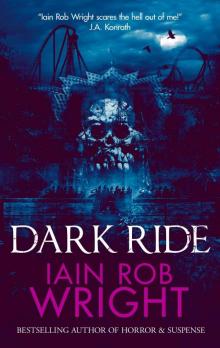 Dark Ride
Dark Ride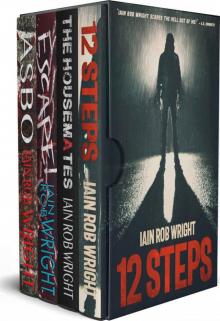 Gripping Thrillers
Gripping Thrillers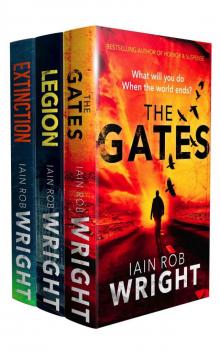 Hell on Earth Trilogy: The Complete Apocalyptic Saga
Hell on Earth Trilogy: The Complete Apocalyptic Saga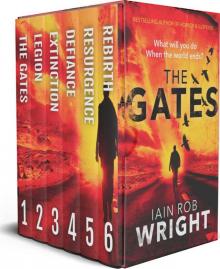 Hell on Earth- the Complete Series Box Set
Hell on Earth- the Complete Series Box Set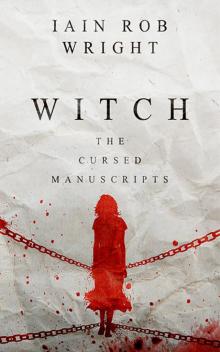 Witch: A Horror Novel (The Cursed Manuscripts)
Witch: A Horror Novel (The Cursed Manuscripts)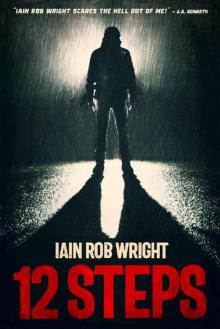 12 Steps
12 Steps A is for Antichrist
A is for Antichrist Blood on the Bar
Blood on the Bar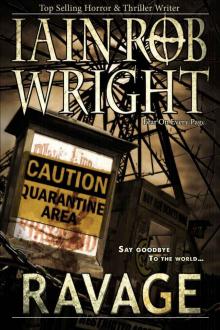 Ravage: An Apocalyptic Horror Novel
Ravage: An Apocalyptic Horror Novel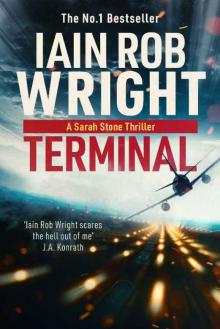 Terminal (Major Crimes Unit Book 4)
Terminal (Major Crimes Unit Book 4)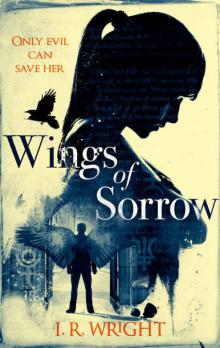 Wings of Sorrow (A horror fantasy novel)
Wings of Sorrow (A horror fantasy novel) Blood on the Bar (Lucas the Atoner Book 1)
Blood on the Bar (Lucas the Atoner Book 1)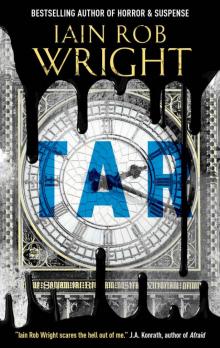 Tar: An apocalyptic horror novella
Tar: An apocalyptic horror novella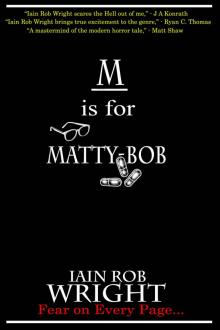 M is for Matty-Bob (A-Z of Horror Book 13)
M is for Matty-Bob (A-Z of Horror Book 13)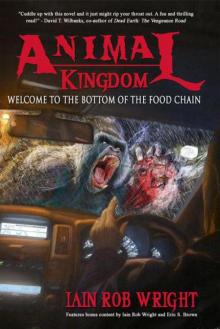 Animal Kingdom
Animal Kingdom Animal Kingdom: An Apocalyptic Horror Novel
Animal Kingdom: An Apocalyptic Horror Novel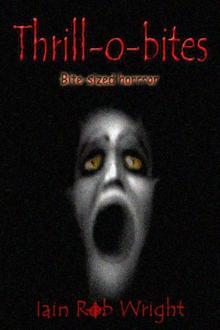 Thrillobytes: bite-sized horror
Thrillobytes: bite-sized horror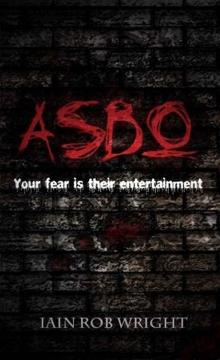 ASBO: A Thriller Novel
ASBO: A Thriller Novel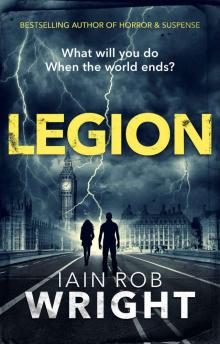 Legion: An Apocalyptic Horror Novel (Hell on Earth Book 2)
Legion: An Apocalyptic Horror Novel (Hell on Earth Book 2) J is for Jaws (A-Z of Horror Book 10)
J is for Jaws (A-Z of Horror Book 10)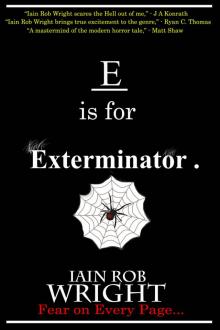 E is for Exterminator (A-Z of Horror Book 5)
E is for Exterminator (A-Z of Horror Book 5)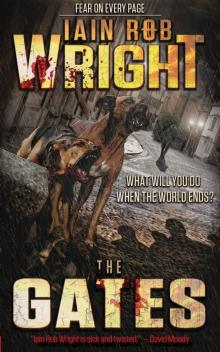 The Gates: An Apocalyptic Novel
The Gates: An Apocalyptic Novel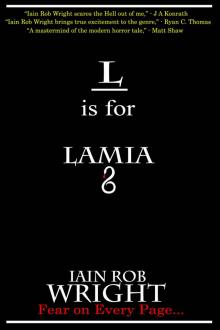 L is for Lamia (A-Z of Horror Book 12)
L is for Lamia (A-Z of Horror Book 12)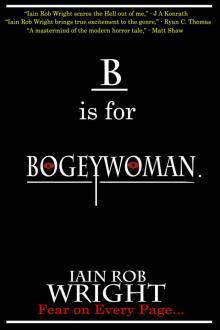 B is for Bogeywoman (A-Z of Horror Book 2)
B is for Bogeywoman (A-Z of Horror Book 2)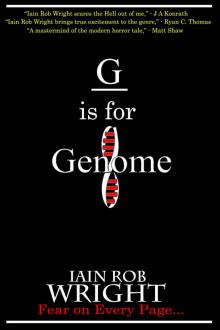 G is for Genome (A-Z of Horror Book 7)
G is for Genome (A-Z of Horror Book 7)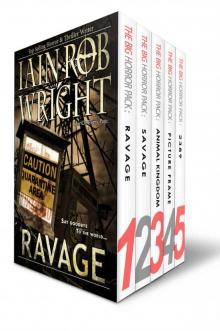 The BIG Horror Pack 2
The BIG Horror Pack 2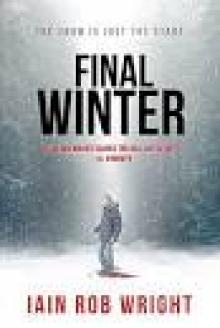 The Final Winter: An Apocalyptic Horror Novel
The Final Winter: An Apocalyptic Horror Novel The World's Last Breaths: Final Winter, Animal Kingdom, and The Peeling
The World's Last Breaths: Final Winter, Animal Kingdom, and The Peeling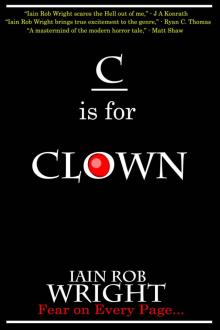 C is for Clown (A-Z of Horror Book 3)
C is for Clown (A-Z of Horror Book 3)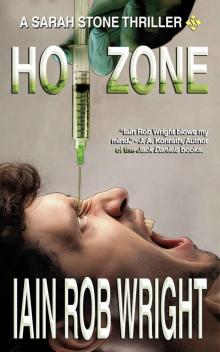 Hot Zone (Major Crimes Unit Book 2)
Hot Zone (Major Crimes Unit Book 2)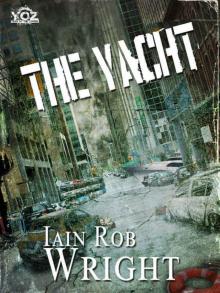 The Yacht (Year of the Zombie Book 3)
The Yacht (Year of the Zombie Book 3) Slasher: the Escape of Richard Heinz
Slasher: the Escape of Richard Heinz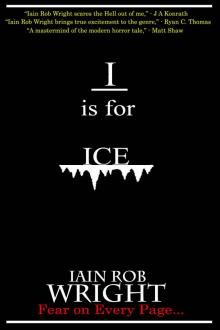 I is for Ice (A-Z of Horror Book 9)
I is for Ice (A-Z of Horror Book 9)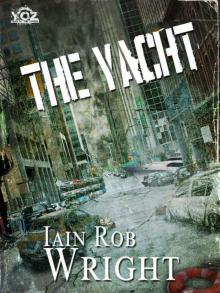 Year of the Zombie (Book 3): The Yacht
Year of the Zombie (Book 3): The Yacht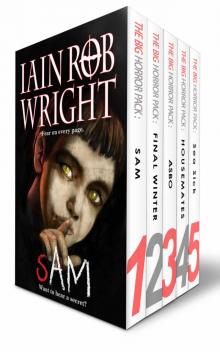 The BIG Horror Pack 1
The BIG Horror Pack 1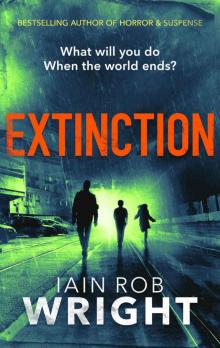 Extinction: An Apocalyptic Horror Novel (Hell on Earth Book 3)
Extinction: An Apocalyptic Horror Novel (Hell on Earth Book 3)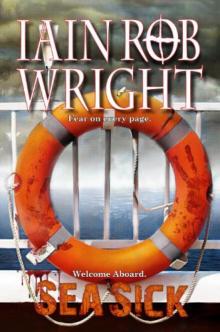 Sea Sick: A Horror Novel
Sea Sick: A Horror Novel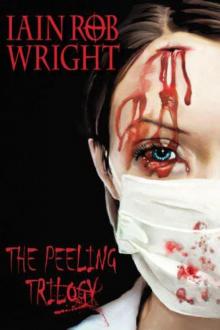 The Peeling Trilogy
The Peeling Trilogy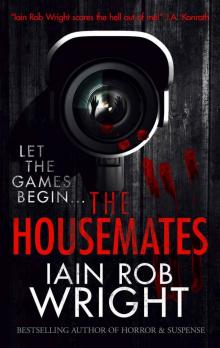 The Housemates: A Novel of Extreme Terror
The Housemates: A Novel of Extreme Terror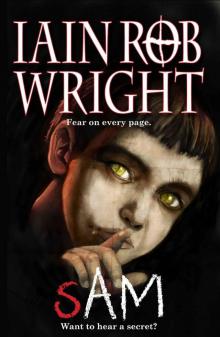 Sam
Sam